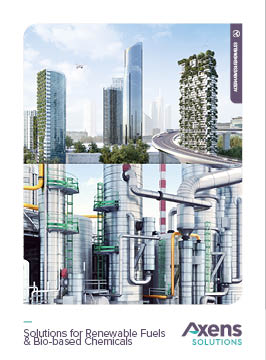
Many different solutions are required to decarbonize the economy; especially in sectors like transportation and chemical industries where cutting GHG emissions is necessary yet difficult.
Built upon solid biobased feedstocks and biotech foundations of IFPEN of more than 40 years, Axens has developed an extensive knowhow and industrial experience in the renewables field to sustain the challenges of the energy transition actors.
Axens offers today the largest portfolio to transition towards bioeconomy in such sectors; providing a large panel of technologies that can be used and combined in multiple pathways to supply numerous renewable products from various sustainable feedstocks.
As the transportation fuel and chemical markets require urgent shifts to meet future demands while lowering average carbon intensity of fuels and products, the use of renewable & alternative feedstocks will play an increasing role in the game tomorrow.
Axens is actively contributing to meet this future demand for Renewables & Alternatives products by providing technologies for producing high-quality middle distillates (jet fuel and diesel) and gasoline.
As the transportation fuel and chemical markets require urgent shifts to meet future demands while lowering average carbon intensity of fuels and products, the use of renewable & alternative feedstocks will play an important role in the game tomorrow.
Today, the main substitute to gasoline is first generation bio-ethanol produced from food crops (sugar beet, sugar cane or starchy crops such as corn, wheat...) via fermentation process.
The chemical industry needs to address challenges related to circular economy and society growing demand for more sustainable products and lower industrial carbon footprint.
Bio-based chemicals open the door to green value chains for chemicals and polymers with high attractiveness that can certainly help overcome these challenges. In this realm, Axens provides technologies to convert renewable alcohols into olefins, which are a key compound for the chemical industry.
The IEA estimates that approximately 18% of all industrial-sector CO2 emissions originate from petrochemical production while less than 1% (or 2 TPY) is derived from renewable sources, highlighting the opportunity for carbon-conscious consumers and policy-makers to expand the use of renewable, non-edible biomass feedstocks into the chemicals markets.